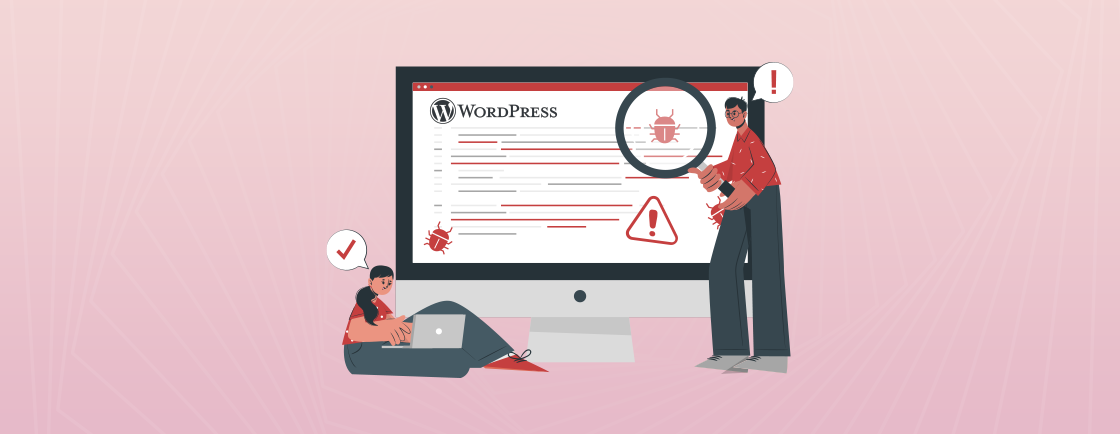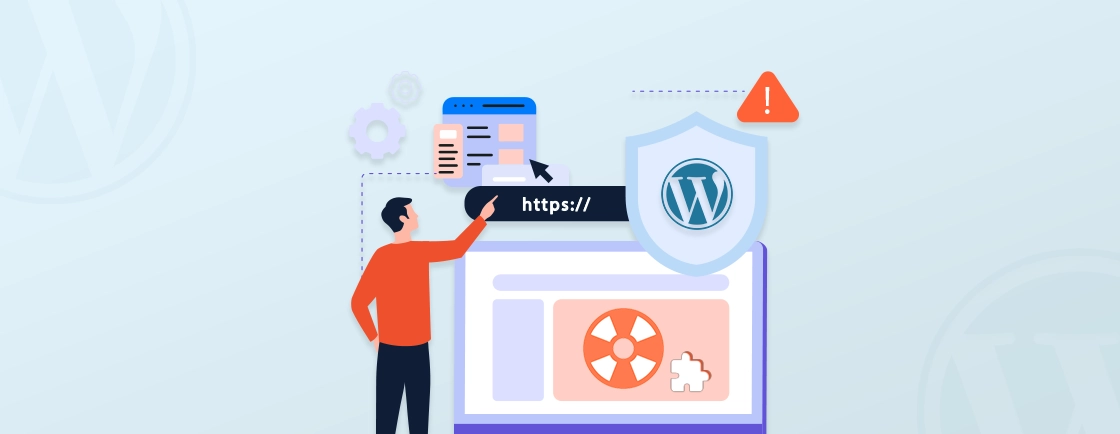Table of Contents
In a world where digital privacy and online security are increasingly at the forefront of our concerns, the importance of safeguarding your WordPress website cannot be overstated. As the digital landscape evolves, so do the methods employed by black hackers to exploit vulnerabilities.
With more sensitive data being exchanged online than ever before, ensuring the integrity and security of your online presence has become a fundamental responsibility. Amidst the complex realm of online security, the SSL certificate stands as a formidable partner.
In this article, we’ll uncover the incredible importance of SSL certificate for WordPress this small but mighty digital certificate. We’ll explore how the SSL certificate can be a game-changer for WordPress site owners, enhancing not only the security but also the credibility and success of your online venture.
So, let’s dive into the world of SSL and discover the profound impact it can have on your WordPress website.
What is SSL Certificate in WordPress?
An SSL (Secure Sockets Layer) certificate is a digital certificate that plays a pivotal role in ensuring WordPress security.
Every day there are 30,000 websites that get hacked which is why – analyzing such scenarios each big to small data file needs secure data transferring between a user’s web browser and your WordPress server. This encryption is critical because it prevents unauthorized individuals from intercepting and deciphering the data as it moves between the two points.
Here’s How SSL Certification Works
When a visitor accesses your WordPress website, their browser and your server establish a secure connection through the SSL certificate. This secure connection is signified by the “https” in the website’s URL and is often accompanied by a padlock icon in the browser’s address bar.
These visual indicators assure users that their connection with your site is encrypted and safe. The SSL certificate is especially vital in scenarios involving sensitive data transmission, such as login credentials, personal information, and payment details. This cryptographic security is comparable to using WordPress salts for key protection. It ensures that this information remains confidential and protected during its journey across the internet.
In summary, an SSL certificate in WordPress serves as a digital guard, guaranteeing the privacy and security of user data, enhancing visitor trust, and fortifying your site against various online threats. It’s a fundamental component for maintaining the integrity and security of your WordPress website in an era where online privacy and security are of paramount importance, confirming whether WordPress is safe.
Importance of SSL Certificate in WordPress
In an era where data is the new treasure and online threats stalk every virtual corner, the role of an SSL certificate and how to add an SSL certificate to WordPress in safeguarding your WordPress website cannot be overstated. Let’s begin our exploration of its significance with the first and foremost point: Protecting User Data.
1. Protecting User Data
One of the primary reasons to use SSL on your WordPress site is to safeguard user data. SSL encrypts the information exchanged between the user’s browser and your server, making it nearly impossible for cybercriminals to intercept and misuse this data.
2. Building Trust
Websites with SSL certificates display a padlock icon in the browser’s address bar, signifying a secure connection. This visual cue boosts visitor trust and the credibility of your site. Visitors are more likely to stay and interact with your content or make a purchase when they see that their data is protected.
3. SEO Benefits
Search engines, like Google, favor secure websites. Having an SSL certificate can positively benefit WordPress SEO, and result in higher search engine rankings, potentially leading to higher visibility and more organic traffic for your WordPress site.
4. Compliance with Regulations
Data protection regulations, such as the General Data Protection Regulation (GDPR), require websites to protect user data. SSL is a fundamental component of compliance with these regulations, ensuring you avoid legal complications and potential fines.
5. Preventing Cyber Attacks
Hackers often target unprotected websites. SSL helps in preventing cyber attacks, such as getting WordPress site hacked and malware infection, which can have devastating consequences for your WordPress site.
6. Secure Online Transactions
If you are starting a WooCommerce store, SSL is non-negotiable. It provides the necessary security for online transactions and protects customer payment data. Without SSL, customers may be hesitant to make purchases on your site.
In a world where online security is a growing concern, implementing an SSL certificate on your WordPress website is not just good practice; it’s essential.
It protects user data, builds trust, boosts SEO rankings, ensures compliance, and defends your site against cyber threats. If you haven’t already, consider securing your WordPress site with an SSL certificate today. Your visitors and your online presence will thank you for it.
Steps to Install and Configure SSL Certificate for WordPress
SSL certificates play a pivotal role in ensuring encrypted, secure connections, protecting user data, and enhancing trustworthiness. In this section, we’ll take you through a step-by-step process to install and configure an SSL certificate for your WordPress website, making it a safer and more reputable online destination.
Step 1: Preparing for SSL Installation
Before diving into the technical aspects of SSL certificate installation, it’s crucial to lay the groundwork for a smooth process. This initial step will help you get organized and ensure you have everything you need to secure your WordPress website. Securing access is equally important to setting strong WordPress permissions.
- Select the Right SSL Certificate Type: Determine whether you need a free Let’s Encrypt certificate or a commercial SSL certificate based on your site’s requirements.
- Choose a Trusted Certificate Authority (CA): If you opt for a commercial certificate, research and select a reputable CA to purchase your SSL certificate.
- Verify Hosting Compatibility: Ensure that your web hosting provider supports SSL certificates and check if you have the necessary access to your server or hosting control panel.
By getting these preliminary steps right, you’re setting the stage for a successful SSL certificate installation. In the upcoming steps, we’ll guide you through the technical aspects of making your WordPress website more secure, trustworthy, and better positioned in search engine rankings.
Step 2: Obtaining the SSL Certificate
With your preparations in place, the next step is to obtain the SSL certificate. Whether you’re going for a free or commercial certificate, this process involves obtaining the digital key that will encrypt data on your website.
- Free SSL Certificates: If using Let’s Encrypt, use Certbot or a similar tool to automatically obtain and install your certificate.
- Commercial SSL Certificates: Purchase the certificate from your chosen CA and follow their specific instructions for obtaining it.
Obtaining your SSL certificate is a pivotal step in enhancing the security and trustworthiness of your WordPress site. The choice between a free or commercial certificate depends on your needs and budget. Once you have your certificate in hand, you’re ready to move on to the next stage of installation.
Step 3: Installing the SSL Certificate
Now that you have your SSL certificate, it’s time to install it on your web server. This step is crucial in enabling secure data transfer and displaying the padlock icon in the browser’s address bar.
- Web Hosting Control Panel: Access your web hosting control panel and navigate to the SSL/TLS section.
- Install Certificate: Upload or paste the SSL certificate and associated private key.
- Verify Installation: Confirm that the SSL certificate is correctly installed.
Successfully installing your SSL certificate marks a significant milestone in making your WordPress website secure and trustworthy. The padlock icon and “https” will now assure your visitors of a safe connection.
Step 4: Configuring SSL for WordPress
With the SSL certificate installed, you’ll need to configure your WordPress site to use it properly. This ensures that all data transmitted between your site and visitors is securely encrypted.
- Update WordPress Settings: Go to your WordPress dashboard, navigate to the “Settings” menu, and update the “WordPress Address” and “Site Address” to include “https.”
- Content Mixed Warnings: Resolve any mixed content warnings by updating URLs in your content, themes, and plugins to use “https.”
Properly configuring your WordPress site to utilize SSL is essential for ensuring all data is encrypted, and your site functions seamlessly in secure mode.
Step 5: Implementing 301 Redirects
To ensure all visitors access your site via the secure “https” protocol, you’ll need to set up 301 redirects. This step prevents users from accessing the non-secure version of your site.
- .htaccess File (Apache Server): Add code to your .htaccess file to force https redirects.
- WordPress Plugins: Use WordPress plugins like Really Simple SSL or WP Force SSL to automate the process.
By implementing 301 redirects, you’re guaranteeing that every visitor is directed to the secure version of your website, enhancing both security and user experience.
Step 6: Testing Your SSL Certificate
After completing the technical setup, it’s vital to test your SSL certificate to ensure it’s functioning correctly and there are no security issues.
- SSL Checker Tools: Use online SSL checker tools to verify the certificate’s installation and configuration.
- Browser Testing: Manually test your site on different web browsers to ensure the padlock icon is displayed and the connection is secure.
Thoroughly testing your SSL certificate is a crucial step in guaranteeing its effectiveness and that your visitors can trust the security of your website.
Step 7: Ongoing Maintenance and Renewal
Security is an ongoing process. This step focuses on maintaining your SSL certificate and ensuring it stays up to date.
- Renewal Reminders: Set up renewal reminders, so you don’t forget to renew your SSL certificate before it expires.
- Regular Updates: Keep your WordPress, plugins, and themes updated to maintain compatibility with the latest SSL standards.
Regular maintenance and renewal of your SSL certificate are essential to keep your website secure and functioning optimally.
By following these steps, you’ve not only secured your WordPress site but also strengthened its trustworthiness and search engine ranking, providing a safer and better experience for your visitors.
Testing and Troubleshooting SSL certificate installation
After successfully installing an SSL certificate for your website, it’s essential to conduct thorough testing and be prepared to troubleshoot any issues that may arise. This step ensures the SSL certificate functions correctly and your website remains secure. Below are key steps to test and troubleshoot your SSL certificate installation.
- Browser Testing: Open your website in various web browsers (Chrome, Firefox, Edge, Safari, etc.) to ensure that the padlock icon or “secure” label is displayed in the address bar. This signifies that the SSL certificate is functioning correctly.
- SSL Checker Tools: Utilize online SSL checker tools, such as SSL Labs’ SSL Server Test, to assess the SSL configuration of your website. These tools provide detailed reports on your SSL certificate’s status and any potential issues.
- Mixed Content Warnings: Check for mixed content warnings, which can occur when some resources (images, scripts, stylesheets) on your website are loaded over HTTP instead of HTTPS. Resolve these mixed content issues to ensure a fully secure connection.
- Renewal and Expiry Check: Make a note of the SSL certificate’s expiration date and set up reminders well in advance. Ensure you renew the certificate before it expires to avoid any disruptions in your site’s security.
- Error Messages: Find and access WordPress error logs that may indicate SSL issues. Common errors include SSL handshake failures, expired certificates, or insecure protocols. Investigate and resolve these errors promptly.
Regular testing and proactive troubleshooting are essential to maintain the security and functionality of your SSL certificate. By following these steps, you can identify and address potential issues before they impact your website’s security and user experience.
For more complex troubleshooting, it can be highly beneficial to hire WordPress developer with expertise to quickly identify and fix SSL-related issues without risking your site’s performance or security.
Conclusion
In a world where online security is a growing concern, implementing an SSL certificate on your WordPress website is essential. It protects user data, builds trust, boosts SEO rankings, ensures compliance, and defends your site against cyber threats.
If you haven’t already, consider securing your WordPress site with an SSL certificate today. The SSL certificate serves as a silent sentinel, guarding your website and its visitors against the ever-evolving landscape of online threats.
By understanding its importance and following the steps to install, configure, test, and troubleshoot, you’re not only safeguarding your WordPress site but also ensuring it thrives in the competitive digital arena.
If you encounter any challenges along the way, don’t hesitate to contact us. Our experienced WordPress developers are all set to handle any obstacles and ensure a seamless SSL certification integration on your WordPress site. For end-to-end security implementation and long-term site maintenance, choosing a trusted WordPress website development company like ours is the smart decision.
FAQs About Importance of SSL Certificate for WordPress
Does having an SSL certificate really boost user trust in my WordPress site?
Yes, it does. When visitors see the padlock icon in the browser’s address bar or “https” in your URL, they know their connection is secure. This builds trust and confidence in your website, encouraging users to engage with your content or make purchases.
Is it mandatory to have an SSL certificate for a WordPress site, or is it just a recommended best practice?
While it was once considered a best practice, having an SSL certificate is now a necessity. It’s required for compliance with data protection regulations like GDPR, and it’s a fundamental measure for protecting user data and your website’s credibility.
How often should I renew my SSL certificate for my WordPress site?
SSL certificates typically need to be renewed annually. It’s essential to keep track of the expiration date and renew the certificate in a timely manner to avoid interruptions in your site’s security.
Create with WordPress CMS
Build flexible and scalable websites using WordPress's powerful content management system.





